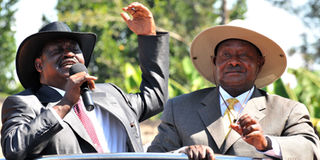The good and the ugly in visiting Kenyan politicians

ACCOMPANIED: Prime minister Odinga was in Busoga region with Mr Museven
Kampala
In African tradition, other wives would gripe or hate relatives or neighbours of a polygamous man if they hobnobbed only with the first wife.
Today, top Kenyan politicians, among them Vice President Kalonzo Musyoka, are in this catch-22 situation having exalted President Museveni during visits to Uganda where they made no mention of opposition parties. “Mr Museveni has done the job [of Head of State] very well and that is why I came to show solidarity,” Mr Musyoka told Saturday Monitor in an interview on Friday as he exited the country. It’s a year of general elections here and some 13.9 million registered voters go to the polls on February 18, barely five weeks away.
The campaigns have now gone to the wire as each of the eight presidential candidates, including Mr Museveni, who is seeking to extend his uninterrupted rule to 30 years, are courting whichever voter, regional or international ally.
Relationship with Rwanda
During the 2001 and 2006 presidential elections, unproven allegations that Rwanda government supported Dr Kizza Besigye, the present joint Inter-Party Cooperation flag bearer, put diplomatic relations between Kigali and Kampala on the ice.
It, ironically, was not officially distasteful for Ms Rebecca, the widow of SPLM/A leader John Garang, to canvass votes for Mr Museveni in 2006. Such is the contradiction, and sometimes fury, that prominent Kenyans, in whose country Mr Museveni is highly rated in contrast to his jinxed domestic scorecard, have courted controversy by stepping into the murky political waters of Kampala.
Prime Minister Raila Odinga previously joined the Ugandan leader on a campaign trail in the country’s eastern Busoga region; Mr Musyoka weighed in mid-week while Mr Museveni was canvassing votes in the West. In November, now suspended Higher Education Minister William Ruto attended the launch of NRM’s campaign manifesto in Kampala, ostensibly as a friend of the party and Mr Museveni.
That same month, former President Daniel arap Moi was Mr Museveni’s private guest for three days, although it is understood they spoke more about South Sudan’s secession plebiscite and regional security than sharing political survival tips.
Mr Moi’s son, Mr Gideon Moi, who leads a faction of Kenya African National Union (KANU) party, is among a battery of Nairobi politicians reported to have campaigned for NRM.
So what is their interest in Uganda’s politics, aware Mr Museveni’s alleged involvement in Kenya’s disputed December 2007 elections rattled citizens on either side on the back of a bloody backlash?
Diplomats in Kampala, who preferred not to be named, say the reasons vary with each Kenyan actor.
Mr Odinga, who waved to the crowd of Mr Museveni’s supporters without explicitly telling them to vote the man, sees himself as Kenya’s next President. It, therefore, pays for him to ally with the Ugandan leader, with whom he has, according to leaked US diplomatic cables, had alleged strange relationship over the PM’s perceived plan to build a Luo dynasty in the region. It’s intriguing that Mr Odinga joined Mr Museveni on the vote hunt just days before whistle-blower website, WikiLeaks, published the mistrust among the two principals.
Also when President Museveni attended the ceremony for promulgation of Kenya’s new Constitution, a section of suspected Odinga-led Orange Democratic Movement (ODM) party supporters heckled him.
This, they did, because they considered that Mr Museveni, the first foreign government leader to congratulate Mr Kibaki upon his dubious victory, somehow had a hand in troubling events of the time.
With Mr Odinga positioning himself for the 2012 elections, pundits argue, it is useful to make amends and that is why the two leaders discussed regional issues such as fast-tracking the East African political federation and promoting trade. Uganda mulls exporting locally-manufactured Anti-retroviral drugs to Kenya so as to partly correct the trade imbalances between the neighbours.
It has emerged that Uganda and Kenya have secretly agreed to start the political federation so that other reluctant countries, especially an “overly cautious” Tanzania, can join at a later stage as it happened with the formation of the 27-member European Union.
However, substantive discussions on the matter, focusing mainly on finance, foreign policy and defence, are expected to be expedited during the upcoming April EAC Heads of State extra-ordinary meeting that will consider a report of the committee of eminent persons which drafted the blue-print on political federation prospects and challenges.
Reference for peers?
Mr Museveni, one of the longest-serving African leaders, is the de facto elder statesman in the region plus his involvement in EAC since its rejuvenation in 1999 makes him a reference for peers, partly explaining why Kenyan politicians troop here.
On the latest visit, VP Musyoka delivered to his host President Kibaki’s message seeking Uganda’s support for Kenya’s proposal to try six of its top politicians indicted by the International Criminal Court, locally. It is understood the matter is due for discussion by African political executives during the African Union summit due in Addis Ababa on Jan. 31 to Feb. 1.
Whichever way the influx of Kenyan leaders is looked at, the opposition is jittery their public appearance on campaign trail with their rival Mr Museveni, amounts to interference in politics of a sovereign state. Relations between the two neighbours could as well be on the rocks if President Museveni were to lose next month’s vote.




